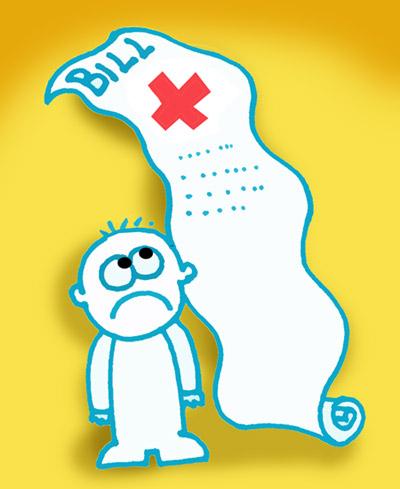 | « Back to article | Print this article |

Irrespective of your age and how good your health has been, the right time to get a health insurance is NOW, says Mukesh Kumar, Executive Director, HDFC ERGO General Insurance Company
Illustration: Dominic Xavier/Rediff.com
Advances in medical sciences have increased the life expectancy significantly in the last few decades. However, changing lifestyle and external factors have resulted in individuals -- especially in urban areas -- living longer, but less healthier today.
Dynamics of Healthcare business have undergone an extensive transformation in the last decade. Having a health insurance is no more an option today -- it is a necessity. Yet people -- especially the young ones -- avoid taking health cover believing this product is meant for elderly people.
Many individuals consider their current good health as a reason for not considering health insurance. Also, many who have health insurance policies develop cold feet at the time of renewal after a couple of claim-free years.
Most people do not even bother about health insurance till they touch their 40s and begin to struggle with health issues that come with age. However, today’s reality is that a medical emergency can strike anytime, to anyone and anywhere.
Everyone -- from newborn children to elderly senior citizens -- is more vulnerable to hospitalisation today than they were a few years ago. There are several trends that make us believe that one must have health insurance at the earliest, irrespective of age, gender or family’s medical history.
1. Changing economics of healthcare
Hospitalisation for medical treatment costs a lot more these days than what it did a decade ago. Estimates suggest that medical inflation in India has been running in double-digits for the last few years.
Today, even a small routine surgical procedure can easily cost up to Rs 100,000. According to the World Bank, 40 per cent of people hospitalised in India are forced to borrow money or sell assets to cover their medical expenses. Hence, people certainly need a protection to safeguard against medical costs.
Also, medical care is becoming less invasive and more costly due to new technology. The cost of super-specialty equipment and robotics is obviously passed on to patients. Not everyone will be able to afford such facilities on their own resources.
Amid changing economics of healthcare, not having a health insurance could be risky to one’s physical as well as financial health.
2. Rise in lifestyle-related ailments
There has been a conspicuous rise in the ailments related to lifestyles such as diabetes, cardio-vascular diseases etc. among Indians. Stress levels in individuals have gone up noticeably in the last few years.
Long working hours, limited or absolute lack of physical activity and exercise, disregard for a healthy balanced diet and a rising dependence on unhealthy fast food lead to weakening immune systems and put individuals at an increased risk of contracting illnesses.
Even women and young professionals are getting vulnerable to such lifestyle ailments. While these are disturbing trends, these are the realities of today’s lifestyle and the lifestyle-related ailments are likely to become major healthcare concern, going forward.
3. Rising instances of accidents
The rising number of vehicles on roads is a sign of economic progress of the country. However, the rising number of vehicles has its own downsides. Rising number of vehicles has resulted in the rise in the number of road accidents.
According to a Journal of Orthopaedics, Traumatology and Rehabilitation research (National statistics of road traffic accidents in India), close to 500,000 road accidents were reported by all states/ union territories during 2011. The proportion of fatal accidents in the total road accidents has consistently increased since 2002 from 18.1 per cent to 24.4 per cent in 2011.
The severity of road accidents measured in terms of persons killed per 100 accidents has also increased from 20.8 in 2002 to 28.6 in 2011.
Exposure of population to road accidents leading to deaths and injuries depends, among other things, on the number of motor vehicles and the amount of motorised traffic. Accidents happen due to victim’s own mistake or even other party’s mistake.
Based on these trends, one can conclude that the health insurance is no more a product for the elderly. In today’s world, where stress and uncertainty are inseparable from human life, health insurance may be the best hedge against the rising cost of staying healthy.
Medical emergencies can strike anyone irrespective of age. There has been an increase in the number of claims being made by the people in the age group of 26-40 years.
Amid this scenario, one cannot afford to wait for the ‘right’ time for taking health insurance. It is a product meant for everyone from a new-born child to an elderly individual -- all of who are vulnerable to medical emergencies, irrespective of age, gender or family’s medical history.
We strongly believe that one should not wait for any accident or medical condition to strike to seek a health insurance. Moreover, it helps to get a health insurance at an early age as the premiums are lower.
We must keep in mind that the world we live in is full of uncertainties and a non-threatening medical condition at times can turn into a critical one. In such times of medical emergencies, a good health insurance policy can keep you financially secure. So irrespective of your age and how good your health has been, the right time to get a health insurance is NOW.